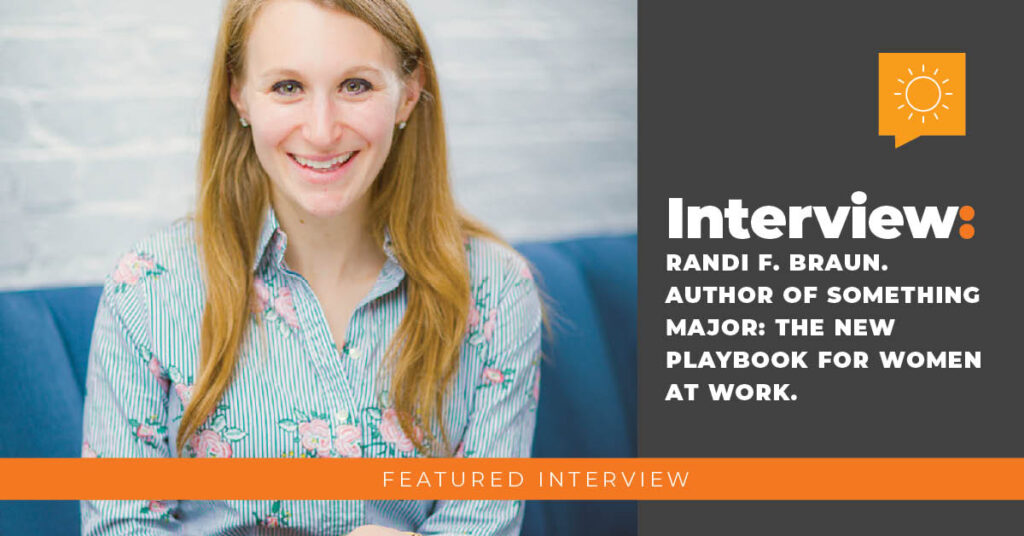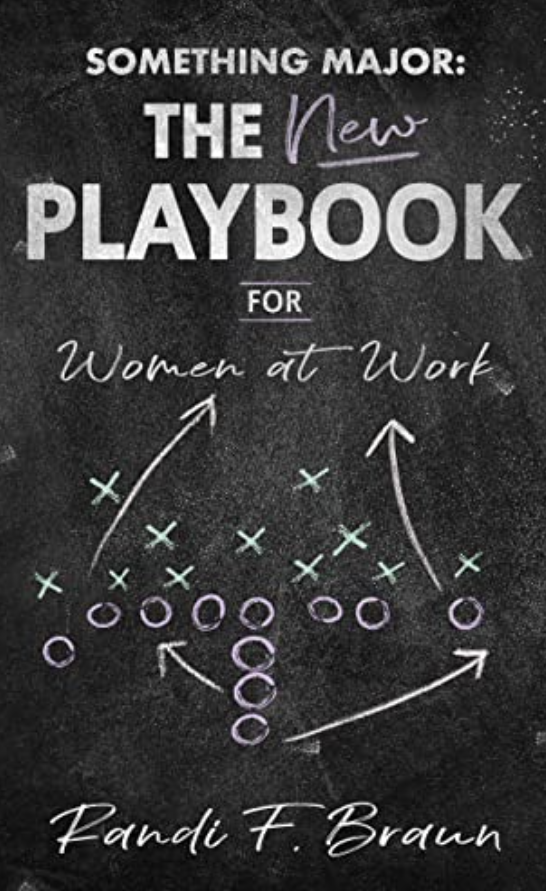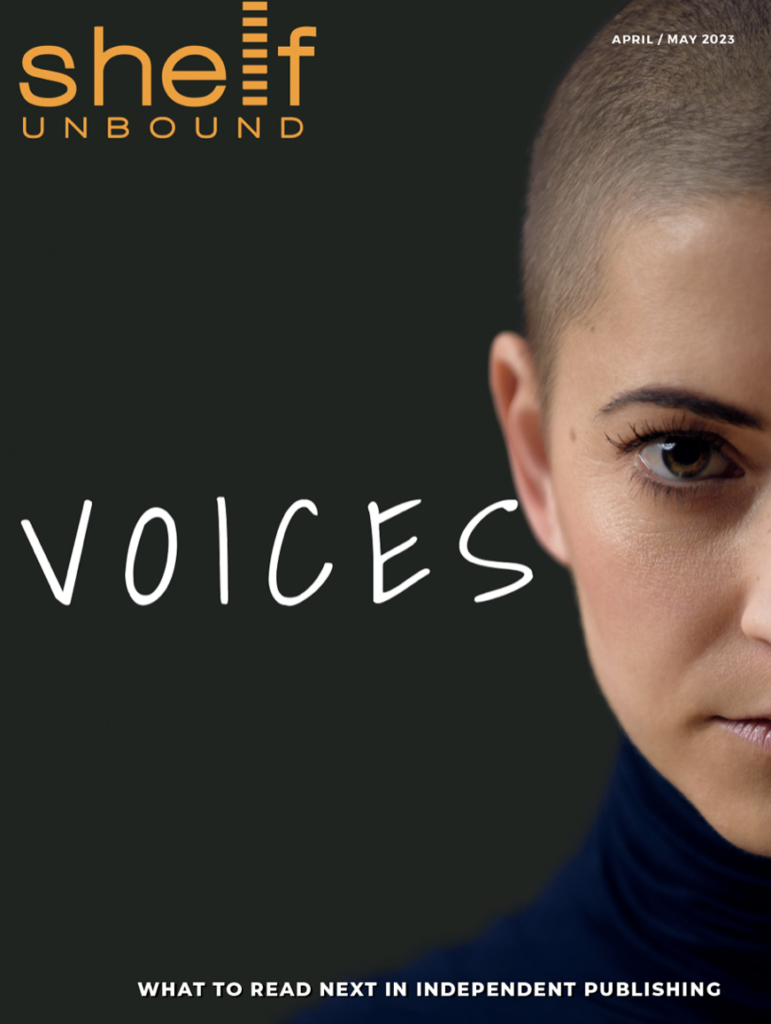
Randi Braun is shaking things up for women in business. She’s the CEO of her own company, Something Major, a leadership and advisory firm, and a certified executive coach who helps her clients “lead their businesses with passion and purpose.” Her ideas have been featured in Forbes, The Chicago Tribune, The Washington Post, Parents Magazine, and other outlets, and she is the author of the recently published Something Major: The New Playbook for Women at Work. Randi says, “We told women they should be leaders but didn’t give them the tools to succeed in a workplace designed for men. The New Playbook finally empowers them to play the game by a new set of rules.” The book includes true stories from women leaders and provides thought-provoking takeaways for readers.

SYNOPSIS: Something Major: The New Playbook for Women at Work
She’s changing women’s lives, one play at a time.
Women are natural leaders but they’ve been taught to play the game by an outdated set of rules. So certified executive coach, Randi Braun, wrote them a new playbook.
In Braun’s book, Something Major: The New Playbook for Women at Work, women will discover how to play the leadership game on their own terms and win when it comes to achieving their goals: whether it’s cracking the code on your self-doubt by ditching perfectionism, external validation, and the tyranny of your inner critic, or learning new tactics for owning your message (don’t miss 16 things she forbids you to say at work). Braun’s book provides a fresh take on one of the most tremendous challenges of our time: empowering women at work to chart their own course to the top — dialing up confidence and fulfillment, and dialing down burnout in the process.
In Something Major: The New Playbook for Women at Work, Braun takes the field and re-writes the plays of the game. She is a sought-after thought leader, speaker, and CEO of the women’s leadership firm, Something Major. Her book delivers stories for today’s women leaders in a conversational style that’s packed with sage advice and wildly entertaining.
INTERVIEW…
Can you give us a little background on you, your business, and how you came to be where you are, both in life and in your career?
RB: I’m 100% the accidental coach and the reluctant entrepreneur. I started my coaching business by accident after having my two kids in two years (and six days). Not because I wanted more “flexibility” as people often assume, but because I doubled my comp during a time that social science tells us my earning potential should have flat-lined due to the “motherhood penalty.” My story got around, and people were constantly asking me for advice on their goals or a negotiation. They thought they wanted to hear my story, but they really needed help writing theirs. It got me curious about coaching, which led me down the path to starting my own coaching firm Something Major as a CEO, becoming a certified coach, and now being a Wall Street Journal best-selling women’s leadership author.
One of the things you do is help people “achieve their goals, lead on purpose, and live happier.” Can you share a few things we should do to fulfill goals and live happier lives?
RB: We spend so much time crushing it on other people’s goals, priorities and needs — and often get crushed in the process. My book is about helping women understand that they can be even more impactful in their careers when they learn how to live by their own boundaries, trust their guts, quiet their inner critic, and own their message … instead of constantly editing our ideas and actions to fit into the mold of what we think everyone else wants from us.
What practices should we not do to fulfill goals and live happier lives?
RB: We have to avoid getting trapped in the tyranny of the “shoulds,” or as one of my clients likes to say: “I have to stop shoulding all over myself.” As I write about in the first chapter, when we’re making too many decisions from a place of “should,” it’s a red flag that we’re either (a) prioritizing other people’s needs over our own or (b) caught in perfectionistic habits and feeling scared about what other people may think about us if we disappoint their expectations … or what we perceive their expectations to be.
You’re in the business of helping ”women leaders thrive in demanding, unpredictable, high-performance, and high-volume environments.” Can your approach apply to all women in all sorts of careers and/or situations?
RB: This book is full of universal messages, and I’m struck by how many people I hear from — the 45-year-old CEO, the 23-year-old college grad, the 65-year-old retiree — all telling me how much it resonated with them. The core messages about cracking the code on our self-doubt, reclaiming our time and boundaries, and redesigning our goals are truly universal.
Let’s talk about the book, Something Major: The New Playbook for Women at Work. Congratulations on its publication! Was writing a book always a long-term goal? How did the idea of a playbook come about? Did anything not make it into the book?
RB: I’ll tell you more about the idea of a “new playbook” below but the crux of it is that we need to equip women with skills that nobody has taught them: how to crack the confidence code, how to untether from external validation when we’ve all been raised with The Good Girl Curse, how to own our message … And yes, there are TONS of material that did not go into this book: I cut a full 10,000 words on things like negotiation and relationship building.
I love how honest you are in the introduction, where you let your readers know that writing Something Major wasn’t easy. What is your writing/revising process like? What did you learn about yourself during the process? Did anything about the publishing process or the industry itself surprise you?
RB: The writing process was so hard but so rewarding. The best piece of advice I got was from Eric Koester, a professor at Georgetown University who leads the Creators Institute, a writing program I used to help write my book. I was dying to ask for an extension on the first draft when he told me, “Finishing your first draft is like having a migraine. You just have to get through it to get over it, so why would you ever ask for an extension?” As somebody who has given birth (twice) I really feel like this was the closest thing I’ve ever experienced to birth!
A few lines from the introduction of Something Major resonated with me: “It’s not that the Old Playbook is necessarily wrong or bad. It’s just that the Old Playbook is way too focused on how we prioritize other people.” Can you expand upon on how to prioritize ourselves and what is “broken with the old system?”
RB: Before I ever wrote the book a woman confessed to me, “I have no desire … in fact, I can’t even remember the last time I was in the mood.” She wasn’t talking about what you think she was talking about. She was talking about a case of what I call “low work libido” and she’s not alone. Unfortunately, there’s just no little blue pill for that. She had done everything “right” and played by all the old rules: she got mentors, she got sponsors, she even went to Harvard, but she still wasn’t happy. I designed a new playbook so that women can learn how to play the game on their own terms and win — whatever winning means to them, at work.
I love your list of things women are forbidden to say (the “I Forbid It” list). How did this list come about? Is it a living document? What’s the one most important item we, as women, should avoid saying to a colleague, in an email, or in a meeting? Do you ever catch yourself from saying anything on the list?
RB: I love that you loved that list, and I can’t tell you how many people write to me about it! The list came about years ago, before I wrote the book, when a male technology executive came to me with a concern: they had appointed a woman to the leadership team, and he thought she had the best ideas. But he couldn’t stand how much she hedged when she raised them and how deferential she was to the rest of the group. How, he asked, could he give her feedback on this without hurting her feelings? I gave him some pointers but then wrote an article about the list, which he ultimately forwarded to her. While I can’t write an article every time an executive asks me for advice, it just clicked for me on this topic, and I think I wrote it in literally under an hour because the ideas had been bouncing around my brain for a long time already. I’m pretty good at not using the words on the list (I really do practice what I preach in this book — and it’s a practice by the way). However, I can tell you that “actually,” “just,” and “sorry” are totally words I used in the past.
The gender gap and the diversity gap are real, and unfortunately, the publishing world is not immune. Do you have thoughts about why that is and what can be done about it so all women and underrepresented writers can benefit?
RB: One of the things that I’m excited about is how the publishing industry is changing with smaller, independent publishing houses popping up (and existing ones thriving) that are run by diverse publishers. This system is so flawed and inequitable. The industry is so ripe for disruption. I’m rooting for big changes … and betting on them.
As the mother of three young women and one young man, I’m interested in your thoughts on raising children in today’s world. First, what can parents and the community do to make sure that our daughters’ experiences will be different from ours? Second, what changes can we make in raising our sons?
RB: One thing I’m constantly conscious of is “what am I modeling for my children?” They have a dad who picks them up daily at the bus stop and cooks us dinner (who, by the way, also works full time) and a mom who is constantly on the road at speaking engagements (I travel more than any other mom I know). We have to model egalitarian roles in our own households, as well as boundaries, downtime, living our values, and self-care. I’m not perfect, but I’m constantly thinking about what my kids are learning from me.
Piggybacking on the previous question, how can the community, especially businesses and organizations, be allies to women, especially women of color, in thoughtful, meaningful ways?
RB: We know that women make 82 cents on the dollar compared to men (a gap that widens by an additional 25+ percent for women of color, by the way). Any organization that wants to close the pay gap or fight systemic sexism or racism can easily do a compensation study to assess and close their gaps. Where there is a will the way is extremely straightforward… the problem is the will.
What’s next for you?
RB: Albert Einstein said the definition of insanity is doing the same thing over again and expecting a different result … and yet, I can’t stop collecting notes for another book I’m dying to write about shaking up the working motherhood conversation. I’m exhausted by people talking to women about caregiving (yes there is a crisis, and we need solutions), but I’m hungry for a new playbook for working moms who are ambitious on the “work” side of the equation and want tools to go for their goals. We’ll see where it goes …

Randi F. Braun is an expert at empowering women who have demanding jobs and bold goals. As a certified executive coach and CEO of the women’s leadership firm, Something Major, she helps women thrive at work.
Braun infuses conversations with life-changing ideas, advancing women leaders one wildly entertaining story at a time.
A sought-after thought leader and speaker, Braun’s insights have been featured in The Washington Post, Forbes, and Parents Magazine, among others. Braun has coached women around the globe and partnered with more than 50 organizations across diverse sectors, including: the Fortune 500, healthcare, start-ups, Big Law, public relations, entertainment, trade associations, government, non-profits, and others. To learn more about Braun’s work, events, and background visit www.SomethingMajorCoaching.com.

